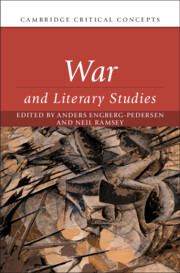Book contents
- War and Literary Studies
- Cambridge Critical Concepts
- War and Literary Studies
- Copyright page
- Contents
- Figures
- Contributors
- Acknowledgments
- Introduction: War, Literature, and the History of Knowledge
- Part I Origins and Theories
- Chapter 1 War and Ancient Athens
- Chapter 2 War and Chinese Culture
- Chapter 3 War and Romantic Thought
- Chapter 4 War and Critical Theory
- Chapter 5 War and French Theory
- Chapter 6 War and Media Studies
- Chapter 7 War and Postcolonial Studies
- Part II Foundational Concepts
- Part III Emerging Concepts
- Index
Chapter 3 - War and Romantic Thought
from Part I - Origins and Theories
Published online by Cambridge University Press: 15 January 2023
- War and Literary Studies
- Cambridge Critical Concepts
- War and Literary Studies
- Copyright page
- Contents
- Figures
- Contributors
- Acknowledgments
- Introduction: War, Literature, and the History of Knowledge
- Part I Origins and Theories
- Chapter 1 War and Ancient Athens
- Chapter 2 War and Chinese Culture
- Chapter 3 War and Romantic Thought
- Chapter 4 War and Critical Theory
- Chapter 5 War and French Theory
- Chapter 6 War and Media Studies
- Chapter 7 War and Postcolonial Studies
- Part II Foundational Concepts
- Part III Emerging Concepts
- Index
Summary
The Romantic theory of war described in this chapter is the product of a group of highly educated Prussian officers trying to grasp the new conditions of politics and warfare that emerged in the wake of the French Revolution. They had studied the philosophy of enlightenment, the history of warfare, and the mathematics of probability, they had read the works of the Classical and Romantic poets of their time, and they had fought in the Revolutionary and the Napoleonic wars. In order to define the nature of war, one of the most eminent of these thinkers, Carl von Clausewitz, relied on Immanuel Kant’s transcendental philosophy. Describing the reality of war, he also relied on three new sciences that had played a role in Kant’s philosophy: the science of static and mechanics, the science of electro-magnetism, and the science of population statistics. The chapter argues that while Clausewitz was not a precursor of Claude Shannon’s mathematical theory of communication, one of the most consequential moments of the digital revolution, he does, however, remain relevant to this day as one of the first theorists of irregular warfare.
- Type
- Chapter
- Information
- War and Literary Studies , pp. 48 - 66Publisher: Cambridge University PressPrint publication year: 2023

